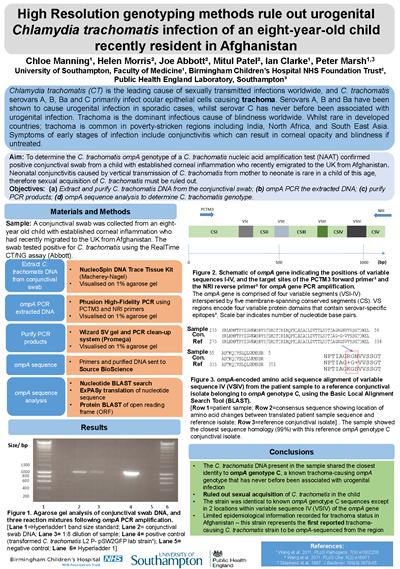Chloe Manning, a PhD student in the Chlamydia Research Group within the School of Medicine, University of Southampton, presented this research at the Global-NAMRIP Festival of Early Career Research on 25 June 2019. The poster can be downloaded via the 'Useful Downloads' link below.

Whilst it is common knowledge that Chlamydia trachomatis causes sexually transmitted urogenital tract infections, it is less well known that certain genotypes of C. trachomatis can cause the blinding disease trachoma. Rare in developed countries such as the UK, trachoma is endemic across poverty-stricken areas of India and Southeast Asia.
The research team were sent a C. trachomatis-positive conjunctival swab collected from an eight-year-old child in Birmingham with corneal inflammation that recently emigrated from Afghanistan.
C. trachomatis-positive conjunctival swabs are not routinely genotyped, however it was vital to exclude sexual acquisition of C. trachomatis in the child, which could have far greater implications for child protection in this case. The team applied high-resolution genotyping methods to conclude that the child had been infected with a C. trachomatis genotype known to cause ocular and not urogenital infection (ompA genotype C).
As trachoma status in Afghanistan is unknown, this represents the first reported trachoma-causing C. trachomatis strain to be genotyped from Afghanistan.
The authors of this research are Chloe Manning1, Helen Morris2, Joe Abbott2, Mitul Patel2, Ian Clarke1, Peter Marsh1,3
1 University of Southampton, Faculty of Medicine,
2 Birmingham Children’s Hospital NHS Foundation Trust,
3 Public Health England Laboratory, Southampton